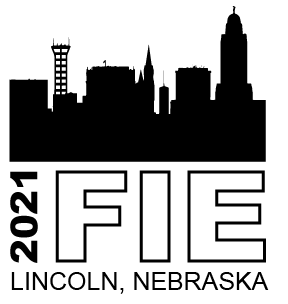Full Paper Guidelines
The anticipated audience for FIE represents a broad spectrum of backgrounds. Attendees cover all disciplines relating to engineering and computing education and come from a variety of institutions and organizations worldwide. Typical interests range from education research to extending promising results into their own educational settings. Attendees are eager to learn not only of your results but how your results might be applied in their particular discipline at their particular institution.
* Please add the term ‘Full Paper’ to the first sentence of your abstract.
You can categorize your paper as:
1. Innovative Practice
2. Research-to-Practice
3. Research
Please note that one author from each paper is expected to register for and participate in the full conference.
These categories influence the overall structure and contents of the submitted work. Each category follows with suggestions for expected paper contents.
1. Innovative Practice Category
The innovative practice category is for scholarly proposals of reflective or novel practice in the area of engineering and/or computing education. Excellent proposals are well situated in prior literature on teaching and learning, and outlines an innovation of value and interest to engineering and/or computing educators.
Abstracts: Innovative Practice Abstracts should be 300-500 words and should clearly present the paper’s relevance to engineering education and how the work is innovative. In addition, each abstract should be identified as a “Full” paper track proposal, and define (minimally) one topic keyword.
Each abstract must briefly state the specific contribution of the paper to the innovative practice of engineering and/or computing education. Contributions may be made in various forms, and should include a description of what is unique about the innovative practice, how the innovative practice differs from and builds on previous practice as documented in the literature, and new ideas that conference participants would take away from this paper. The abstract should describe the setting for the innovative practice in the broad context of engineering and/or computing education, (not necessarily the particular institutional context), motivations for the innovative practice, and the results obtained. Abstracts must present the paper’s relevance to engineering and/or computing education and how the work is innovative.
View the INNOVATIVE PRACTICE REVIEW CRITERIA (pdf, 60 kB) for Abstracts
Review Rubrics for Innovative Practice Full Papers (pdf, 86 kB) for Draft Manuscripts
2. Research-to-Practice Category
The research-to-practice category is for scholarly proposals that outline applications of research in engineering and/or computing education. Excellent proposals are well situated in the theoretical framework(s) that support teaching and learning, and applies these theoretical frameworks to the practice of engineering and/or computing education.
Abstracts: Research-to-Practice Abstracts should be 300-500 words and should clearly present the theoretical frameworks of teaching and learning being applied, and the implications for the practice of engineering and/or computing education. In addition, each abstract should be identified as a “Full” paper track proposal, and choose at least one topic keyword from the engineering education taxonomy (http://taxonomy.engin.umich.edu/taxonomy/.
Each abstract must briefly state the specific contribution of the paper towards illustrating how engineering and/or computing education research informs educational practice. Contributions may be made in various forms, but they should describe the setting for the practice in the broad context of engineering and/or computing education, (not necessarily the particular institutional context), motivations for the practice, research that supported the practice, and results obtained. Abstracts must outline the theoretical frameworks that inform the practice and state the implications for educational practice with a focus on action.
View the RESEARCH-TO-PRACTICE REVIEW CRITERIA (pdf, 60 kB) for Abstracts
Review Rubrics for Research-to-Practice Full Papers (pdf, 88 kB) for Draft Manuscripts
3. Research Category
The research category is for scholarly proposals that outline contributions to research in the area of engineering and/or computing education. Excellent proposals are well situated in prior literature on teaching and learning, and outlines research methods and findings of value and interest to engineering and/or computing educators.
Abstracts: Research Abstracts should be 300-500 words and should clearly present the paper’s research contribution and its relevance to engineering and/or computing education. In addition, each abstract should be identified as a “Full” paper track proposal, and must choose at least one topic keyword from the engineering education taxonomy (http://taxonomy.engin.umich.edu/taxonomy/.
Each abstract must state the specific research contribution of the paper. Contributions may be made in various forms, and should include the research questions addressed, methods used and results found, and a description of how the results build on prior research. Abstracts must provide a summary of the research contribution/expected results and brief statement of the implications for educational practice with a focus on action.
View the RESEARCH REVIEW CRITERIA (pdf, 60 kB) for Abstracts
Review Rubric for Research Full Papers (pdf, 93 kB) for Draft Manuscripts
Contact
PCO
E-mail: fie2021@unl.edu
(for practical questions about your registration)
AppInConf
E-mail: abstracts.fie2021@appinconf.com
(for questions about abstract submission)
Important dates
February 22, 2021
Extended Abstract Submission Deadline
March 8, 2021
All Acceptance Communications
May 17, 2021
Preliminary Paper, Special Session and Panel Summary Papers, and Workshop Outlines, Submission Deadline
June 7, 2021
Review deadline
June 14, 2021
Notification of Paper Revision Requirements and Final SSPCW Acceptance Communication
June 28, 2021
Revised Paper Submission (major revisions)
July 12, 2021
Review Revisions Completed
July 19, 2021
Peer Review Final Acceptance Communication
July 26, 2021
Final Camera-Ready Paper Submission & Copyright Deadline
September 20, 2021
Early Conference Registration Deadline
October 13-16, 2021
CONFERENCE
